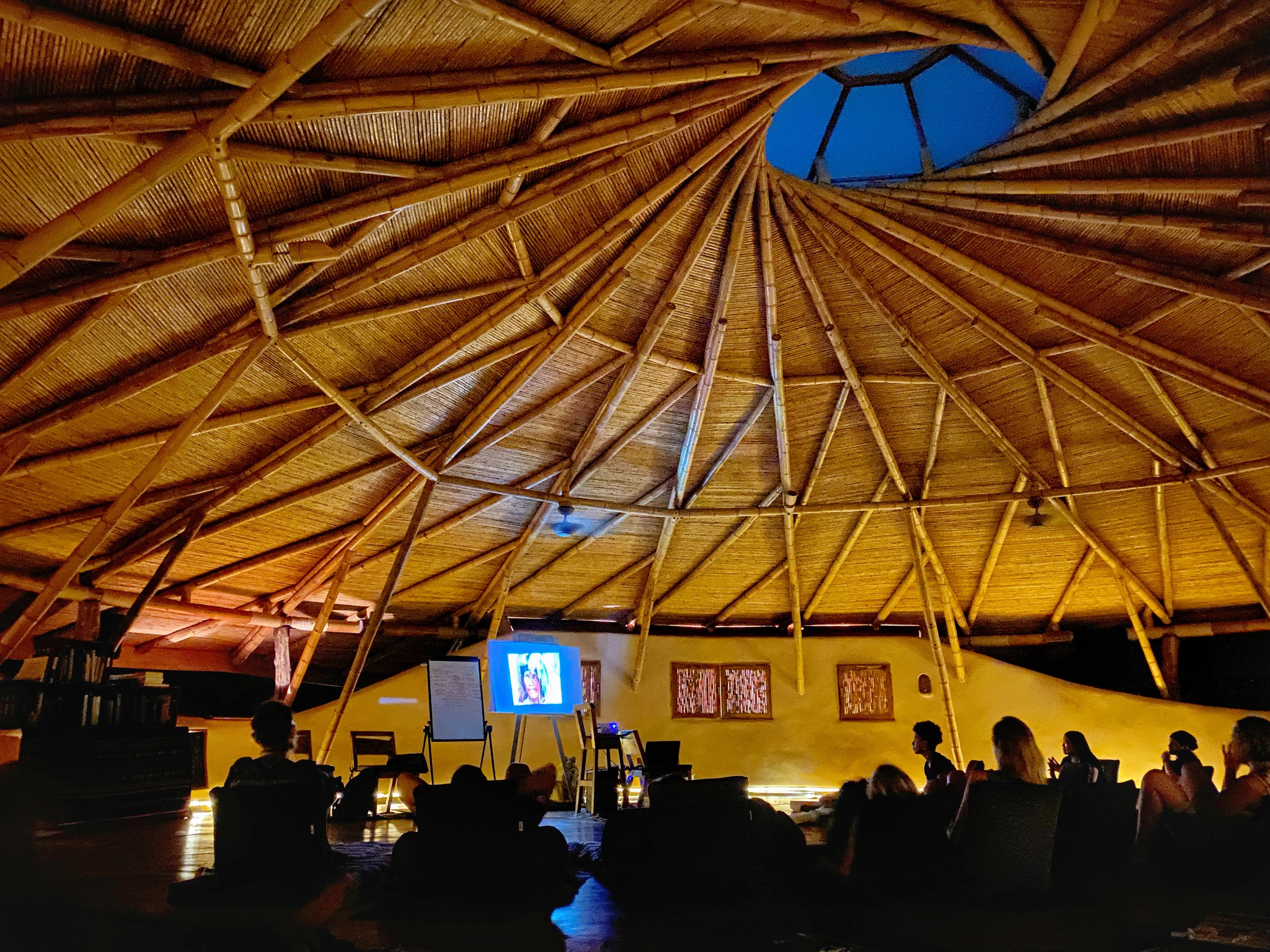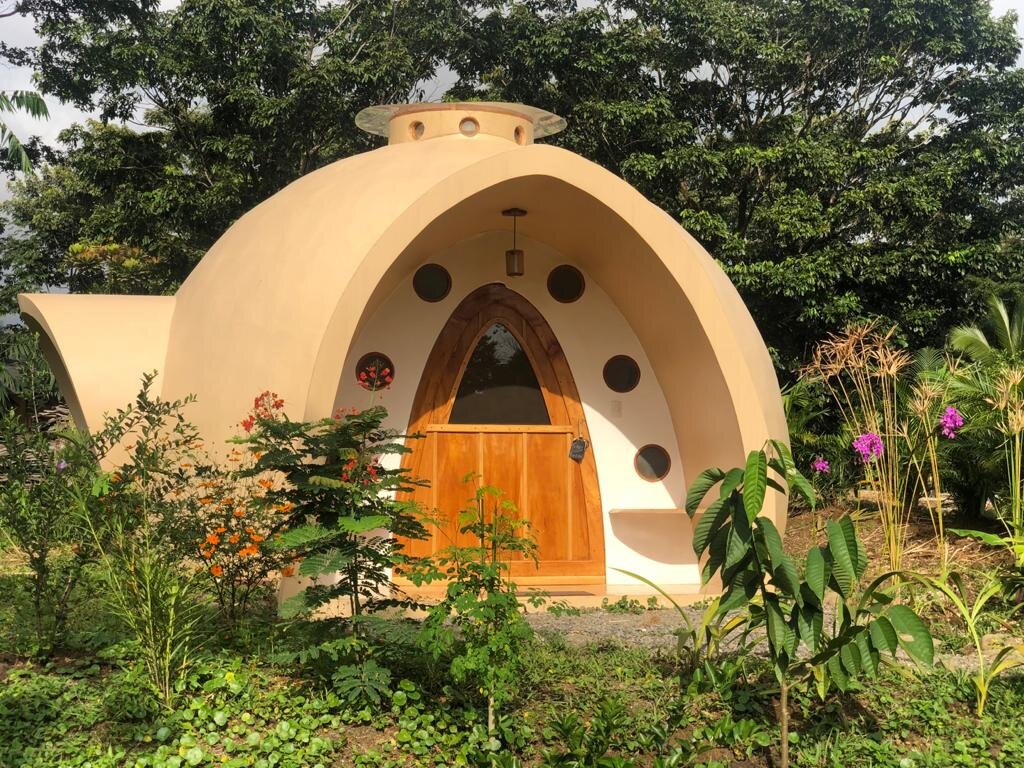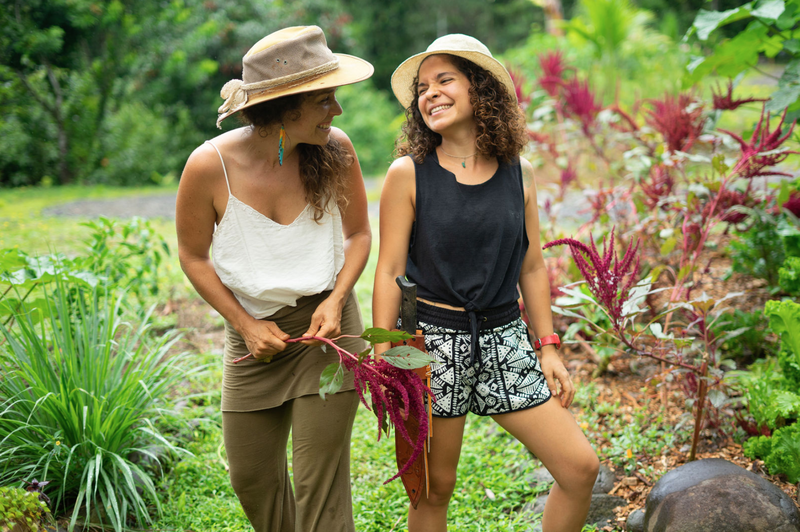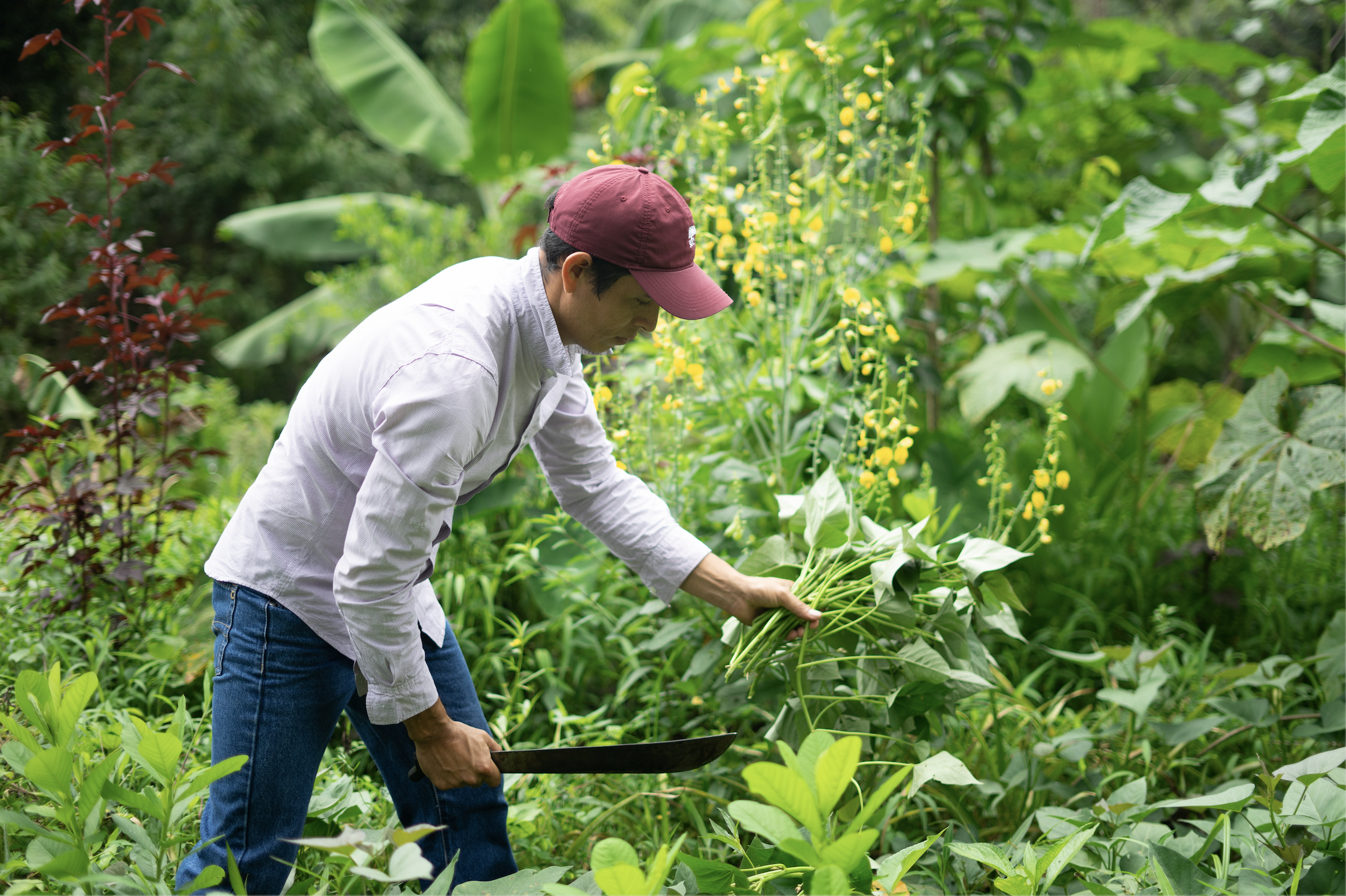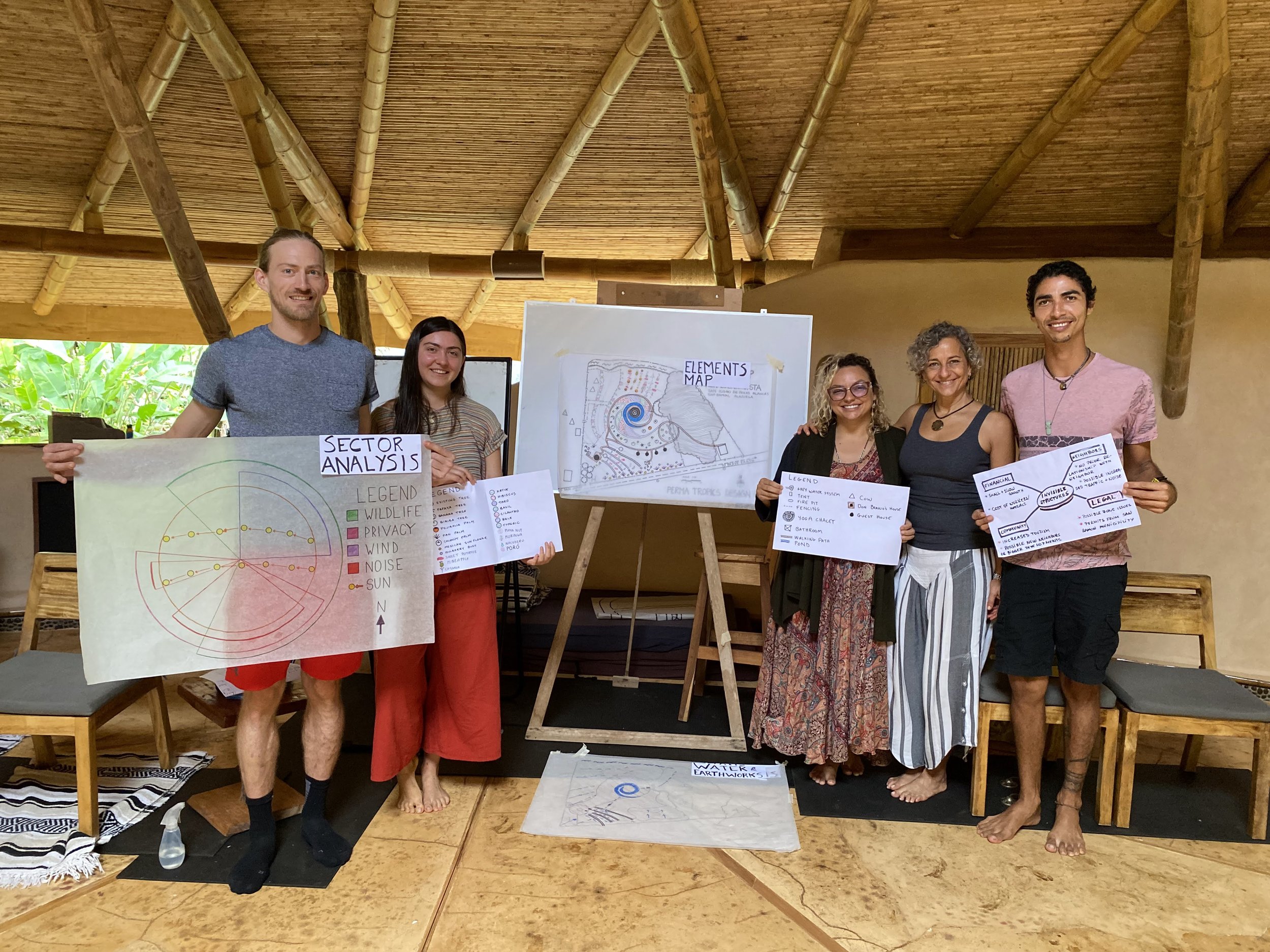“Growing your own food is a revolutionary act. Our food system is at the heart of our culture and society. Change it and we literally change everything.”
Permaculture is a set of design principles centered around whole systems thinking using the patterns found in Nature. By implementing permaculture we're creating new systems for the way we grow our food and steward the land that are in harmony with Nature. This course is applicable to anyone with an interest in designing resilient and regenerative futures as well as professionals in the fields of architecture, planning, ecology, education, farming and community development.
Join our diverse team of permaculture instructors led by Hugo Soto, Elena Valverde and Scott Gallant of Porvenir Design for this life-changing 2-week immersion. The course covers the core Permaculture Design curriculum and emphasizes creating diverse multi-functional human landscapes based on ecological patterns. This is the third annual course offered in conjunction with the Brave Earth and Finca Luna Nueva.
Utilizing these sites as a living classroom, the class will mix lectures and hands-on work, exploring design solutions for both temperate and tropical regions. Putting Permaculture into practice, the course concludes with students working in teams to create their own permaculture site design.
The whole-systems design thinking outlined in the course will give participants the tools to re-design and improve their surroundings; from gardens, farms and homes, to livelihoods, relationships and communities.
This retreat welcomes participants of all genders, including transgender and non-binary people. We are committed to co-creating a space that feels safe and supportive for everyone involved.
WHAT IS A PDC (Permaculture Design Course)?
A PDC is a survey course that introduces students to the core curriculum as originally laid out in Permaculture: A Designer’s Manual (1988). It features a minimum of 72 hours of instructor face-time. It is an introductory course which focuses on the theory of permaculture as a tangible and evidence-based applied design science. It is largely an academic course laid out to inspire, inform, and focus students on the needs of the land and human society.
Permaculture is something you use, not something you do. It is not a course on gardening, but rather on how to design a garden. While often hard/tangible skills are incorporated into the course, the learning outcomes evolve around understanding and applying the ethics, principals, and methodologies of design. In this regard, students should not expect to gain 14 years of knowledge in 14 days. A PDC is a great place to start, but a poor place to stop learning. You will not finish this course as an expert or professional designer: rather, you will leave with an understanding of the broad patterns needed to regenerate our world, and the inspiration and knowledge about what steps to take next.
THE PDC INCLUDES
History of Permaculture
Principles and Ethics of Permaculture Design
Design Methodologies and Site Analysis & Assessment
Pattern Languages in Culture and the Landscape
Reading the Landscape and Pattern Recogintion
Simple Mapping and Surveying Techniques
Client Interviews and Goal Setting
Map Reading
Climate and Microclimate Design
Water: Cycles, Catchment, Ecology, Conservation, Treatment
Greywater and Blackwater Systems
Earthworks, Pond Construction, & Water Storage
Soils: Biology, Ecology, Fertility Strategies
Biofertilizers, Mulching, Biomass Production, Microorganisms Cultivation, Compost Making
Gardening from the Tropics to the Temperate Regions
Orchards Management and Agroforestry
Plant Propagation, Nursery Management
Silvopastural and Aquaculture Systems
Fermentation, Post Harvest Handling, and Harvest Strategies
Shelter and Siting
Urban and Suburban Permaculture Applications and Case Studies
Regenerative Economic Models
Social Structures, Decision Making, and Community Organizing
Professional Designer Project Case Studies
WHY JOIN US?
Without a doubt there are countless PDCs offered around the globe with great teachers and sites to learn from. At Brave Earth, we believe this course fits right alongside the best of them due to our unique jungle location, natural buildings, community integration, and focus on post-capitalist principles.
BRAVE EARTH
Brave Earth (Tierra Valiente) is a living laboratory in service to regenerative living and co-evolution with Nature. Initiated by a diverse group of change-makers, artists, creative innovators, activists and thought-leaders from around the globe with the intention of prototyping a model for community based on biomimetic principles, ancestral wisdom, sacred activism and solidarity economics. The location is a treasure of biodiversity located amidst endless tropical rainforests and world-class, natural thermal baths. The structures are inspired by Nature and are made from sustainable sources including bamboo, adobe, and Aircrete.
FINCA LUNA NUEVA
Finca Luna Nueva, is a living classroom, regenerative farm and rated one of the top 10 ecolodges in Costa Rica. Offering a an organic restaurant and bar, miles of hiking trails through the lush rainforest, a Sacred Seed Sanctuary, featuring 300 plants prized for their medicinal or sacred uses, spa services, and an ozonated pool and jacuzzi. There are several on-site activities available such as night wildlife hikes, birding, a tour of our sacred seed sanctuary and regenerative farm.
THE DESIGN
Design is at the heart of permaculture and consequently we strive to put students in as many design scenarios as possible. In addition to smaller design charrettes, students will spend extensive time on a large group design project. Groups of four to six students are given a piece of land at Brave Earth and a fictional client. They are expected to create a base map of the property, complete a site analysis and assessment, interview the client, and create a design that is presented as a capstone project at the end of the two weeks. Approximately a quarter of the course will be devoted to this project.
THE COMMUNITY NETWORKING
Our goal as instructors is to support all of our students post-course. This has taken many forms in the past, including helping sourcing materials, introductions to specific organizations/people, sharing available job opportunities, and such. One of the great advantages of taking a course at Brave Earth and Finca Luna Nueva is that you become part of the larger Familia Luna community. The opportunity to plug into that is an invaluable part of our PDC.
ABOUT THE INSTRUCTORS
Our diverse teaching team brings ample enthusiasm, knowledge, and experience to the classroom. Having multiple instructors is a huge advantage for students. It means a diversity of opinions and teaching styles. Hugo (pictured below) will be the lead instructor and his team includes Elena and Scott. They will be joined by other guest instructors and local Costa Rican knowledge. Our teaching guild has been working together in various capacities for many years, and each individual brings a unique set of strengths to the course.
Scott Gallant (Co-lead Instructor)
Scott Gallant is an agroforester and food system designer with nearly a decade of experience working in Central America. He is the co-founder of Porvenir Design, a landscape design firm specializing in productive landscapes. He graduated from Wabash College in 2008 with a degree in Economics. He was the farm manager at Rancho Mastatal for nine years, and has worked with diverse projects such as VersaLand, Open Source Ecology, Project Bonafide and many more as he has developed his skill-set in permaculture design. Scott writes for the Permaculture Research Institute and has been featured on the Permaculture Voices, Abundant Edge and Making Permaculture Stronger podcasts. You can find him on instagram here.
Elena Valverde (Co- Lead Instructor)
Elena Valverde is a designer, holistic therapist and herbalist who works to integrate her talents, putting them to service towards her community. Her search for understanding the nature of human beings and the planet earth lead her to explore of the principles of permaculture as a guide to self-knowledge (including the planet earth as part of our existence and experience). Permaculture has become her ally not only in her work with the earth but in her spiritual path
Designing and illustrating are some of her passions. She has worked with Porvenir Design as a designer and photographer for more than 2 years; as well with diverse permaculture projects in Costa Rica such as Brave Earth, Rancho Delicioso and the SOL Center.
Hugo Soto (Instructor)
Hugo Soto started down the permaculture path in 2012. His study of organic agriculture led him to continue to deepen his ways of relating to people and the place. A native of San Jose, Costa Rica, Hugo began by promoting urban permaculture through projects such as community gardens and creating edible spaces featuring native plants. While developing communal gardening projects Hugo also focuses on leading workshops and courses within communities to shift to better soil management and production strategies.
Hugo compliments his passion for design by tying communal design for living well into his approach to planning; he has been trained in working with several forms of design for invisible social structures.
Additional Instructors
Alnoor Ladha: Brave Earth Co-Creator, Activist, Founder of /TheRules
Aly Khan Ladha: Brave Earth Co-Creator and Project Manager
COURSE OUTCOMES
Below we have highlighted the principle learning outcomes and community building and networking advantages that are specific to taking a course at Brave Earth/Finca Luna Nueva and with Porvenir Design.
Students will:
Understand existing global patterns of agriculture, economics, development, etc. and how permaculture design creates a paradigm shift toward new patterns.
Gain an understanding of ecology and its process, specifically focused on soil, water, plants, animals, and microorganisms.
Learn and practice how to approach design problems through site analysis, client interviews, mapping, drafting, etc.
Learn how to identify broad landscape patterns and details and how they relate (scale, order, etc.) and create a context for design work.
Learn and practice design methodologies and processes such as observation, pattern recognition and application, the scale of permanence, etc.
Be able to analyze landscapes across climates for successful human settlements.
Have clear next steps and connections into networks and resources provided by the instructors. Be inspired about their ability to create change where they live.
Language
The course will be taught in English. All instructors speak Spanish.
COURSE START AND ARRIVAL DATES
Arrival day is October 21, 2022. Students are encouraged to arrive between 2-5pm The course will start at 8a.m. on October 22, 2022. Lodging/meals the night of October 21 is included in the cost of the class.
COURSE END AND DEPARTURE DATES
The course will end at around 6 p.m. on November 4th. There will be a post dinner celebration. Students will depart on the morning of November 5th (10 am checkout). Lodging/meals the night of November 4th is included in the cost of the class.
CONTRIBUTION
There are different accommodation options available:
Farm Loft Single (5 singles available)
Single or double bed in shared space/shared facilities
$1,825 pp
Jungle Hut (8 singles available - 4 units)
Private room with 2 single beds/shared facilities
$2025 pp (double occupancy)
Family Jungle Hut (2 units available)
Private room in shared space/shared facilities 2 Rooms with Shared Common Space.
$2025 pp (double occupancy), $2825 pp (single occupancy)
Garden Cabina (3 units available)
Private room with Private Bathroom and AirConditioning
$2225 pp (double occupancy), $3025 pp (single occupancy)
Earth Tambo (2 units available)
Private room/shared facilities
$2225 pp (double occupancy), $3025 pp (single occupancy)
Gaia Dome (5 units available)
Private room, private shower, shared facilities
$2225 pp (double occupancy), $3025 pp (single occupancy)
Tenting Area and Scholarships
We value making this course accessible for folks that are local (Costa Rican) and/or that have limited access. The preference is for Latin American Women, indigenous people and others from the Global South who have less resources to access this kind of opportunities. We have created a covered tenting area and a limited number of partial and full scholarships. See below for details:
Tenting Option - (3 spaces available - Open to all)
Tent area under cover. Bring your own tent, shared facilities
$1650 (single occupancy)
Tenting Option - Partial Scholarship (3 spaces available)
Tent area under cover. Bring your own tent, shared facilities (Deadline Sep 7. Message Hugo here to apply)
$825 (single occupancy)
Tenting Option - Full Scholarship (3 spaces available)
Tent area under cover. Bring your own tent, shared facilities (Deadline Sep 7. Message Hugo here to apply)
$0 (single occupancy)
Costs include instruction, 15 nights accommodations and 3 fresh, organic,
locally-sourced meals per day.
*Transport to and from the lodge or airfare is not included.
Cancelation Policy:
If you cancel before 30 days of your reservation, your deposit will become a credit that you can use at a later date or transfer as a gift. Within 30 days of your reservation, your deposit will be non-refundable.
REGISTRATION
To register for the course please click below:
A 50% deposit will secure your spot in the course.





